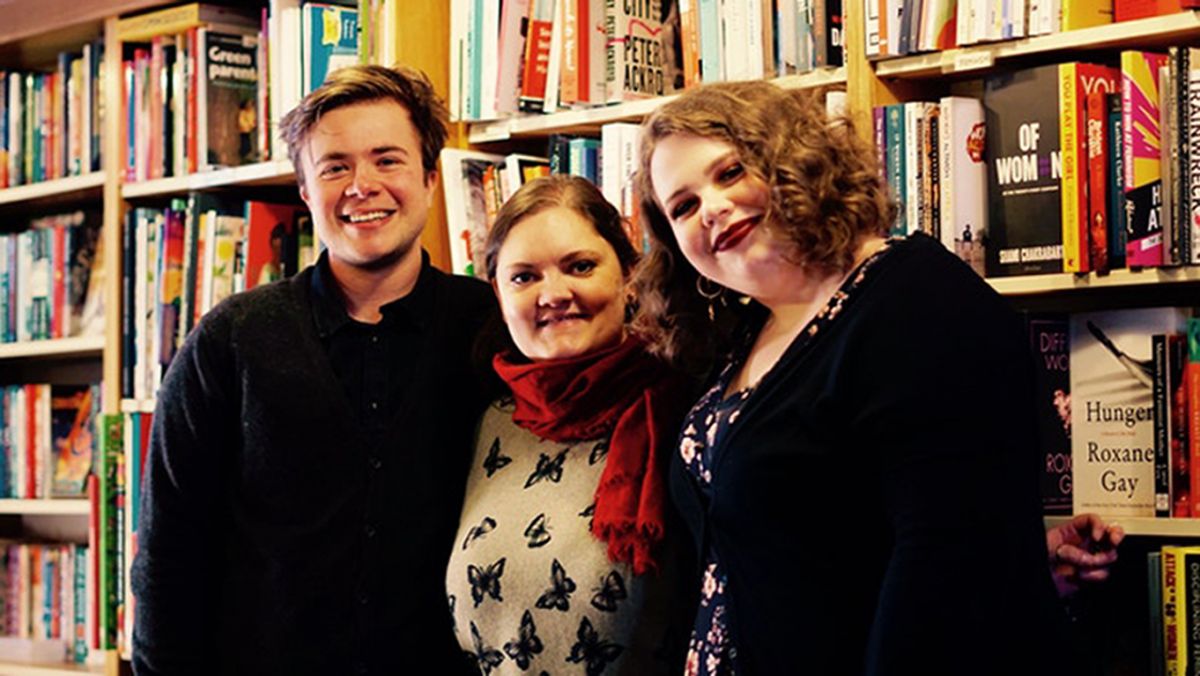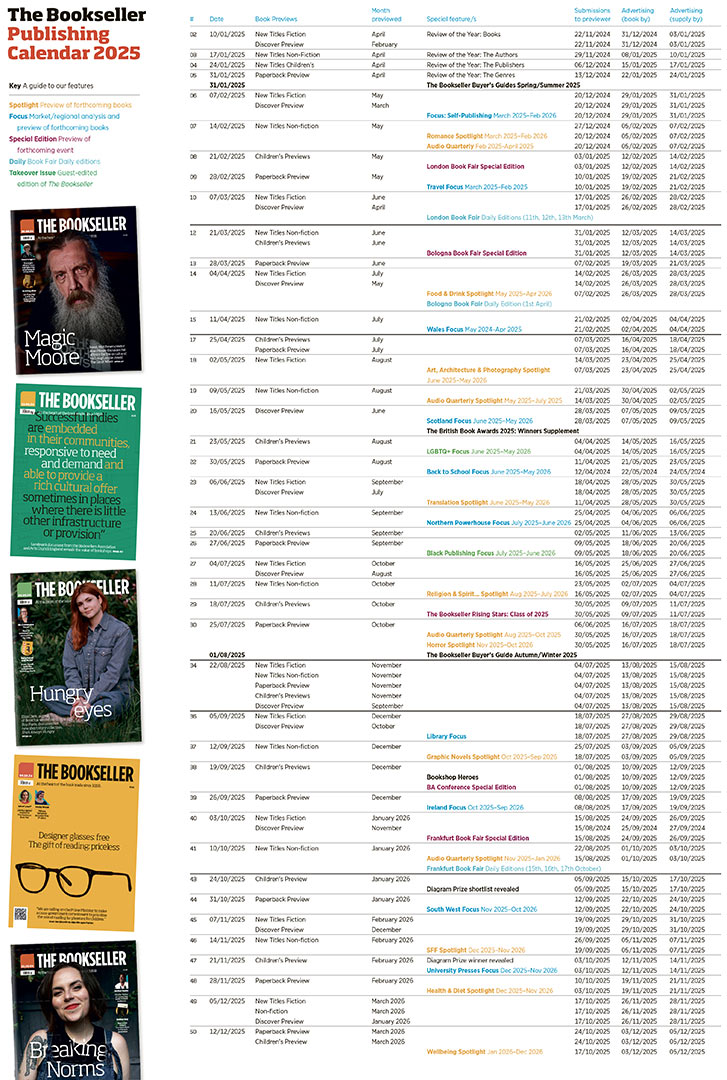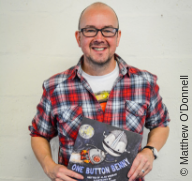You are viewing your 1 free article this month. Login to read more articles.
Scottish indies make their mark with nimble publishing and community ethos
New micropresses are setting up in Scotland’s thriving independent publishing scene, with a desire to improve access to the industry and publish new and under-represented talent. Queer publisher Knight Errant, picture book list Little Door and feminist press Monstrous Regiment—three to have launched in the past couple of years—are united in their optimism and DIY attitude.
Knight Errant was launched by Edinburgh Napier graduate Nathaniel Kunitsky in 2017 when he had an idea for a narrative about gender that he felt hadn’t been explored in book form before. Deciding to put it together himself, he created F, M or Other: Quarrels with the Gender Binary, an anthology about gender, with contributions from authors from across the globe. “On the back of that and my postgraduate dissertation research, I realised that if I wanted to see more unapologetic and brave books out in the world, I needed to do something more direct to make them happen,” Kunitsky said.
Two fellow Edinburgh Napier alumni, Ellen Desmond and Lauren Nickodemus, founded Monstrous Regiment in a move to counter the Londoncentricity of the industry, which saw many of their peers move south to find jobs after graduating from their Publishing degrees. Nickodemus said: “When we completed our MScs at Napier, we saw so many newly qualified, creative friends forced to leave Scotland to take jobs down south—and from what we could see, the majority of them had been keen to use their skills up here. We didn’t want to leave. We were inspired by many of the burgeoning projects in the indie scene in Scotland, where small teams were communicating directly with their audiences to make products that were timely and important.
“There are two publishing Masters programmes nearby, and a lot of talent and enthusiasm coming out of those. But unfortunately, there are not always enough places to put [those skills] when it comes to paid work. More large publishers should consider opening up branches here; there’s such a vibrant literary community and an abundance of skilled workers looking for positions.”
Little monsters
Keen to harness the “exciting, buzzing atmosphere” in the Scottish book trade and the “huge appetite” for local writing, Monstrous Regiment’s mission is to decentralise and democratise the publishing industry and give voices to local and minority artists. Desmond and Nickodemus focus on topics of intersectional feminism, sexuality and gender, which informs the list’s ethos of inclusivity. It led to The Bi-ble, a non-fiction anthology about bisexuality, and a feminist literary magazine featuring fiction, poetry and visual art by Scotland-based creatives.
 Argyll and Bute-based picture book publisher Little Door was founded by children’s theatre professional Alan Windram (pictured right) in 2016 to introduce new illustrators to the publishing world. While touring with a kids’ theatre company, Windram wrote stories about the character he was playing in the shows and, along with his wife Susan, decided to self-publish them. The press teams established authors with new illustrators they find at various places, including degree shows, the Bologna [book fair’s] illustrators’ wall, and even in café artwork displays.
Argyll and Bute-based picture book publisher Little Door was founded by children’s theatre professional Alan Windram (pictured right) in 2016 to introduce new illustrators to the publishing world. While touring with a kids’ theatre company, Windram wrote stories about the character he was playing in the shows and, along with his wife Susan, decided to self-publish them. The press teams established authors with new illustrators they find at various places, including degree shows, the Bologna [book fair’s] illustrators’ wall, and even in café artwork displays.
Windram said: “We make the working process as collaborative as possible, so both author and illustrator feel a real sense of ownership.” He also writes original songs for every title, which he says provides the books with a USP, especially when it comes to live events.
In 2018, Little Door published three “wonderfully different” picture books: How Billy Hippo Learned to Swim by Vivian French, Barry Hutchison’s début Magna Cow and musician Colin MacIntyre’s first picture book The Humdrum Drum. Windram was recently highly commended in the Emerging Publisher category at the 2018 Saltire Literary Awards, and last month his title One Button Benny, illustrated by Chloe Holwill-Hunter, won the £3,000 Bookbug Picture Book Prize. This year the list will launch its Little Door Débuts series, which will see it help an undiscovered illustrator write and illustrate their first picture book. With the help of a crowdfunding platform, Little Door will seek to raise the illustrator’s profile and give them a first step onto the publishing ladder.
Knight riders
Knight Errant is seeing success also. This autumn, First Minister Nicola Sturgeon visited Glasgow-based bookshop Category Is Books and picked up the publisher’s collection Queering the Map, which is “selling really well”. “That was definitely the thrill of the year. It’s very exciting to see a minority voice often ignored in press finally gain ground,” said Kunitsky. It has had great feedback from readers and booksellers, and is on the paperback bestseller list of Edinburgh’s Lighthouse Bookshop. London’s Gay’s the Word has also been a “great champion” of the press.
In the spring it will publish Ely Percy’s début novel, Vicky Romeo Plus Joolz, a genre-blending, queer tartan reply to the rom-coms of the 1980s, written in the style of an American-Italian gangster movie. Then in the autumn, the press will publish volume two of F, M or Other, subtitled Quarrels with the Gender Binary.
The biggest success for Monstrous Regiment has been launch title The Bi-ble, which has sold out three print runs. “Feedback has been incredibly positive and informed us that the content has been meaningful and validating, which assures us we’re on the right track, making books that are socially important,” said Nickodemus.
A challenging market
Running a small press is not without its challenges, and like many other indies, the biggest struggles for these micropresses are financial and time constraints. Desmond and Nickodemus say it is frustrating that while they have the skills, ideas and reader interest they need, they are not always able to invest as much time or money as they would like.
Desmond said: “We run Monstrous Regiment part-time around our day jobs; we prioritise paying authors and designers and reinvesting profits into the company, so at this stage we don’t get a wage ourselves. It’s definitely a passion project, and sometimes time and energy are the biggest challenges. Luckily we’ve had a lot of support and encouragement from fellow small publishers, readers and writers who believe in what we’re doing.”
She added: “[Independent publishing] is definitely having a moment. It seems to be tying into a lot of progressive social movements, and the growth of indie and leftist bookshops in Scotland—like Lighthouse Bookshop and Category Is—is helping that movement grow. This kind of market is motivated by a community of shared belief as well as consumer interest, which can increase reader retention and loyalty.”
On the topic of community, Nickodemus added: “Crowdfunding is going to be a consistent and essential method for indie publishers. It opens the floor for small presses to achieve things they might not have the means for otherwise, and enables a special kind of grassroots democratisation where readers have a personal investment in the production of books, and feel like they have been listened to. It’s exciting to readers for publishing to have a personalised feel—teams who are approachable and transparent—and crowdfunding dovetails so well with that.”
Whatever their routes to market, one thing that cannot be questioned is the micropresses’ durability. Knight Errant’s Kunitsky argued: “Running a press, no matter how small, is no small feat—it’s a challenge whether you are in a team or doing it solo. As a micro distributor, it’s a challenge to cover costs, reach a wide audience and stay afloat. The list of challenges goes on... But we just learn to adapt and overcome.”

(From left) Knight Errant's Nathaniel Kunitsky, Rhiannon Tate and Lenka Murova
Size matters: six Scottish micros
1. 404 Ink
Founded by Heather McDaid and Laura Jones in 2016. An innovative and energetic publisher, 404 Ink’s first book, Nasty Women, was endorsed by Margaret Atwood.
2. Saraband
Based in both Manchester and Glasgow, Saraband found widespread success in 2016 when Graeme Macrae Burnet’s His Bloody Project was shortlisted for the Man Booker Prize.
3. BHP Comics
This comics and graphic novel publisher, based in Glasgow, was founded in 2011. As well as books, the press is the producer of festival Glasgow Comic Con, which is now in its ninth year.
4. Charco Press
Launched in 2017, the Latin American literature specialist won Best Emerging Publisher at the 2018 Saltire Awards, and has had a title up for the Republic of Consciousness Award for Small Presses two years in a row.
5. Fledgling
Edinburgh psychologist Zander Wedderburn launched this press in 2000. As its name suggests, the press publishes work by début authors and emerging talent.
6. Luna Press
Founded in 2015 by SFF author Francesca T Barbini, a number of the press’ titles raise money for various charities, with donations taken from Luna’s share of the profit.













